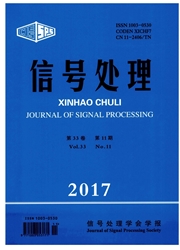

 中文摘要:
中文摘要:
作为概率假设密度(哲学博士) 的典型实现过滤,顺序的蒙特卡罗哲学博士(SMC 哲学博士) 广泛地在高度非线性的系统被采用。然而,粒子贫穷问题由采样步介绍了,和高计算的负担问题,可以导致表演降级并且在实际应用制止 SMC 哲学博士过滤器的使用。在这个工作,一个新奇 SMC 哲学博士过滤器基于粒子赔偿被建议解决上面的问题。根据粒子贫穷问题上的全面分析,第一,产生机制的一个新粒子被开发补偿粒子。然后,所有粒子集成于 SMC 哲学博士过滤器框架。模拟结果证明与 SMC 哲学博士过滤器比较,那建议 PC-SMC-PHD 过滤器能够克服粒子贫穷问题,以及在不同情形为某个追踪的精确性改进处理的率。
 英文摘要:
英文摘要:
As a typical implementation of the probability hypothesis density(PHD) filter, sequential Monte Carlo PHD(SMC-PHD) is widely employed in highly nonlinear systems. However, the particle impoverishment problem introduced by the resampling step, together with the high computational burden problem, may lead to performance degradation and restrain the use of SMC-PHD filter in practical applications. In this work, a novel SMC-PHD filter based on particle compensation is proposed to solve above problems. Firstly, according to a comprehensive analysis on the particle impoverishment problem, a new particle generating mechanism is developed to compensate the particles. Then, all the particles are integrated into the SMC-PHD filter framework. Simulation results demonstrate that, in comparison with the SMC-PHD filter, proposed PC-SMC-PHD filter is capable of overcoming the particle impoverishment problem, as well as improving the processing rate for a certain tracking accuracy in different scenarios.
 同期刊论文项目
同期刊论文项目
 同项目期刊论文
同项目期刊论文
 期刊信息
期刊信息
